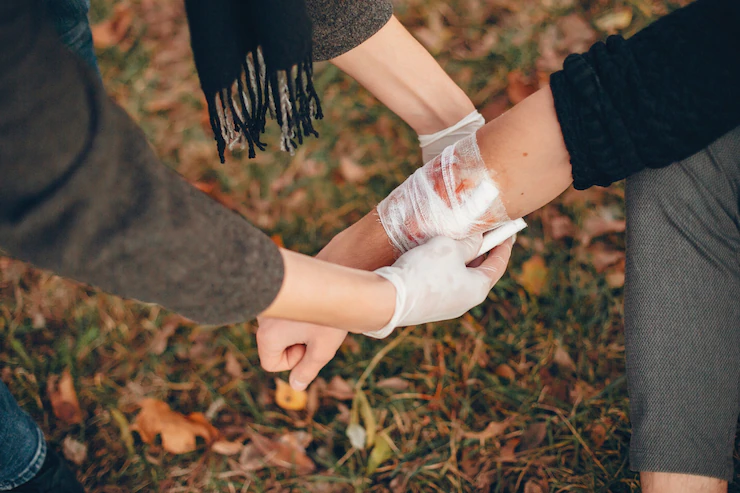The Best Topical Treatments For Flesh Wounds
The healing of flesh wounds, whether they are small cuts and scrapes or more significant injuries, is a critical aspect of overall health and well-being. To promote optimal wound healing, it’s essential to choose the right creams and medications that facilitate the process. Here, we will explore the best creams and medications for healing flesh wounds, providing an overview of their types, usage, and effectiveness.
Contents
Antibacterial Ointments:
Antibacterial ointments are a common choice for treating minor cuts, scrapes, and wounds. These ointments are designed to prevent infections, which can slow down the healing process. Some popular antibacterial ointments include Neosporin, Polysporin, and Bacitracin.
These ointments typically contain one or more antibiotics that help kill bacteria and reduce the risk of infection. They also create a protective barrier over the wound, which can prevent contaminants from entering. Application is simple; clean the wound, apply a thin layer of the ointment, and cover it with a bandage. It’s important to use these ointments in moderation and only for minor wounds, as excessive use can lead to antibiotic resistance.
Hydrocolloid Dressings:
Hydrocolloid dressings are another effective option for wound healing, particularly for pressure sores, blisters, and moderate to severe wounds. These dressings are made of a gel-like material that absorbs fluid and creates a moist environment, promoting wound healing.
Hydrocolloid dressings have several advantages, including the ability to stay in place for several days, reducing the need for frequent dressing changes. They also help manage wound exudate (fluid) and protect against infection. These dressings are especially useful for wounds that require a moist healing environment.
Silver Sulfadiazine Cream:
Silver sulfadiazine cream is commonly used for burns and can be helpful for other types of wounds, such as abrasions, lacerations, and surgical wounds. This cream contains silver, which has antimicrobial properties and can help prevent and treat infections.
Silver sulfadiazine cream creates a protective barrier over the wound while delivering silver ions to the site, which can help reduce the risk of bacterial contamination. It is often prescribed by healthcare professionals for severe burns and deep wounds.
Honey-Based Products:
Honey has been used for centuries for its natural healing properties. Honey-based products, such as medical-grade honey or honey-infused wound dressings, are gaining popularity in wound care. Honey contains enzymes and antimicrobial properties that can help clean wounds and promote healing.
Honey-based products create a moist environment, which is conducive to wound healing, and they can help reduce inflammation and minimize scarring. These products are particularly useful for chronic wounds, pressure ulcers, and diabetic foot ulcers.
Alginate Dressings:
Alginate dressings are made from seaweed and are highly absorbent. They are particularly effective for wounds with heavy exudates, such as venous ulcers and pressure sores. Alginate dressings form a gel when they come into contact with wound fluid, providing a moist environment for wound healing.
These dressings are known for their ability to absorb excess fluid, which can help reduce the risk of maceration (softening of the skin due to excess moisture). Alginate dressings are also useful for wounds with irregular shapes, as they can conform to the wound’s contours.
Topical Growth Factors:
Topical growth factors, such as recombinant human epidermal growth factor (VEGF), are used to stimulate the natural healing process of the body. These growth factors can be especially beneficial for chronic wounds and non-healing ulcers. They help promote cell proliferation, tissue repair, and wound closure.
Growth factors are available in various forms, including gels and ointments. They work by applying them directly to the wound site, facilitating tissue regeneration and healing. However, their use often requires a healthcare professional’s prescription.
Nonsteroidal Anti-Inflammatory Drugs (NSAIDs):
Nonsteroidal anti-inflammatory drugs (NSAIDs) like ibuprofen can help reduce pain and inflammation associated with wounds. While they do not directly facilitate wound healing, they can make the healing process more comfortable and reduce swelling and discomfort.
NSAIDs are typically taken orally, but some topical formulations are available for localized pain relief. It’s important to use these medications as directed by a healthcare professional to avoid potential side effects.
Sterile Saline Solution:
Sterile saline solution is an essential part of wound care, especially for cleaning wounds. It is used to rinse and clean the wound before applying other wound care products or dressings. The saline solution helps remove debris, bacteria, and other contaminants, promoting a clean environment for healing.
You can easily find sterile saline solution in most drugstores, and it’s a valuable addition to any first aid kit for wound cleaning.
Corticosteroid Creams:
Corticoster, rashes, or allergic reactions. While they do not directly promote wound healing, they can improve the overall comfort and appearance of the affected area.
Corticosteroid creams are generally available over the counter, but it’s important to use them according to the instructions and for the recommended duration to avoid potential side effects like skin thinning.
There are various creams and medications available to facilitate the healing of flesh wounds, and the choice depends on the type and severity of the wound. When selecting the appropriate treatment, it’s essential to consider factors like the nature of the wound, the presence of infection, and the individual’s overall health. Personal injury attorneys in Chicago always press the importance of seeking the care of a healthcare professional, especially for more severe or complex wounds, to ensure the most suitable treatment plan for optimal healing. Proper wound care and the use of the right products can help prevent complications and promote a faster and more comfortable recovery.
Read Also:
- What Are Brain Disorders? Symptoms, Treatment, And Prevention
- 10 Best Fitness Apps That Will Help You Lose Weight Quickly [2022 Update]
- How to Deal with Mental Health Issues Such as Depression, Panic Attacks and Anxiety



